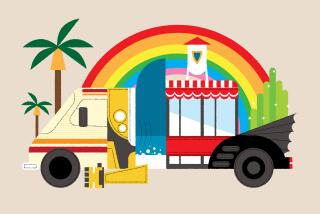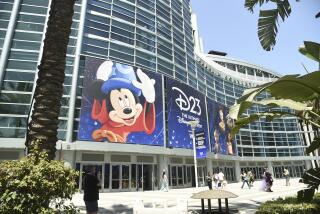Walt Disney Co. Drops Plans for Burbank Project : Company Cites Doubled Costs, Says Revenue Would Not Support Theme Park
Walt Disney Co. has scuttled plans to build a $611-million theme park and shopping mall in downtown Burbank, saying estimated revenue would not support the project.
The abrupt withdrawal, announced Friday by disappointed Burbank officials, brought an un-Disneylike tone to the cityâs 15-year effort to develop a 40-acre site as the centerpiece of redevelopment in the troubled downtown area.
It also was seen as a victory of sorts for entertainment rival MCA Inc., which had filed two lawsuits claiming that Burbank officials denied MCA the opportunity to submit an alternative proposal. The Disney project, titled âDisney-MGM Studio Backlot,â would have competed with MCAâs Universal Studios Tour in nearby Universal City.
Disneyâs Chairman and Chief Executive Michael D. Eisner said the project did not show potential for success. It was to have included a fantasy-theme hotel, a restaurant featuring performing robots, a movie-theme adventure ride and an artificial lake called âthe Burbank Oceanâ on top of a six-story parking structure.
âExceed Guestsâ Expectationsâ
As the plans moved forward, Eisner said, Disney found that estimated costs had more than doubled from an original $300 million and profit would not offset the higher costs. When the company began scaling back plans, Eisner said, the proposal began to lose its distinction as a Disney undertaking.
âWhen we started playing around with the concept and eliminating things like the Burbank Ocean, it started becoming a project that it would not take Disney to do,â Eisner said. âWith Disney, we have to exceed our guestsâ expectations, and they expect a lot.â
Eisner also said the project would have suffered from competition with neighboring shopping malls, such as the Glendale Galleria, and inconvenient freeway access.
Disney officials said further study had shown that attendance at the complex would probably be less than the 12.2 million projected last year. They said the company invested $2.5 million and more than 22,000 man-hours on planning, market research and economic analysis.
The decision marks the first time in years that Disney has canceled a theme park project of such magnitude. In the 1970s, two proposed resorts in California were scrapped--including a winter and summer resort at Mineral King that was bitterly opposed by environmental groups.
In response to a question, Disney Vice President Erwin Okun said the company would not issue a press release about the projectâs cancellation, although he did intend to notify news services and publications that had previously published stories on the matter. âThe information is being made public through the city managerâs office of the city of Burbank,â Okun said.
Burbank City Council members said Friday that the door was now open for MCA to make a pitch.
âLetâs see if MCA will come running over now with their checkbook,â said Councilman Al F. Dossin. âItâs a prime piece of land. I donât think weâll have any problems finding takers and getting a good price on the land.â
Some Optimism Remains
Sidney J. Sheinberg, MCAâs usually outspoken president and chief operating officer, declined to comment on Disneyâs withdrawal. After a long pause, the MCA executive said: âIâd better not.â
MCA attorney Daniel Shapiro said the company had not had a chance to determine what action it would take. One of MCAâs lawsuits against Burbank was dismissed by a Superior Court judge in January, and MCA has filed an appeal. The other lawsuit, which claims that the city violated the stateâs open-meeting law in its negotiations with Disney, is pending.
Last year, MCA executives angrily contended that Disney had offered to withdraw from Burbank if MCA would cancel its plan to build a studio tour in central Florida. Disney denied the claims, and both companies are pressing ahead with construction of their respective tours and sound-stage facilities.
On Friday, Eisner âabsolutelyâ rebutted MCAâs past suggestion that the Burbank project had been a smokescreen to try to discourage competition in central Florida.
Burbank City Manager Bud Ovrom expressed optimism that his cityâs site would be developed. âMaybe it wonât be a Disney entertainment complex, but it has tremendous development potential and I am totally confident that we will find a project that everyone in Burbank will be proud of,â Ovrom said.
But Councilwoman Mary Lou Howard, who had gone to Eisner last year to solicit the proposal, took a dimmer view.
âI call this Black Friday,â Howard said. âItâs devastating, and the whole community is going to lose by this. This project was going to secure the economic base of this community for future generations.â
When told how her colleagues still had hopes that a project could be found for the site, Howard became angry.
âI donât see how they can say that,â she said, her voice cracking. âWeâre just going to get a run-of-the-mill center just like everyone else.â
Chronology of Burbank Project
Jan. 7, 1987--Burbank Councilman Robert R. Bowne first suggests that the city ask Walt Disney Co. to âdream a dream for Burbankâ after a shopping center project that was planned for a 40-acre parcel in downtown Burbank falls through.
Jan. 9--Councilwoman Mary Lou Howard calls Disney executives with Bowneâs idea.
Jan. 22--Howard and City Manager Bud Ovrom have lunch with Disney Chairman Michael D. Eisner to discuss the idea further.
Feb. 3--Eisner sends a letter to Burbank declaring interest in developing the site. Shortly afterward, Disney âimagineersâ begin forming plans for the center.
April 28--After months of hard negotiations, Disney executives show Burbank officials a videotape produced by the city of Dallas imploring Disney to build a project in that city. âHere we were . . . playing hard to get, and any other city would have given their eyeteeth for a Disney project,â Ovrom says. âThat tape opened our eyes.â
May 5--The Burbank City Council votes unanimously to give Disney the go-ahead to develop a theme park, shopping mall and âHollywood Fantasy Hotelâ on the downtown site. Disney has the option of buying the property for $1 million, a price that city officials concede is a bargain. At the same meeting, a lawyer for MCA Inc., which has its headquarters in nearby Universal City, complains that his company should have been given an opportunity to bid against Disney.
June 25--MCA files a lawsuit charging that Burbank conducted meetings in secret. The suit asks that the agreement be terminated and that dealings on the siteâs development be open to the public and other developers.
July 6--MCA files a second lawsuit charging that Burbank failed to provide an environmental impact report or specify the costs of the agreement.
Oct. 30--Planners for Disney say the complex, which now will cost an estimated $611 million, may have to be scaled down before the development would be a sound investment.
Jan. 21, 1988--A Los Angeles Superior Court judge dismisses the second MCA lawsuit, saying that no environmental assessment was needed because specifics of the project had not been determined.
April 8--Disney withdraws from the project.
More to Read
Inside the business of entertainment
The Wide Shot brings you news, analysis and insights on everything from streaming wars to production â and what it all means for the future.
You may occasionally receive promotional content from the Los Angeles Times.











